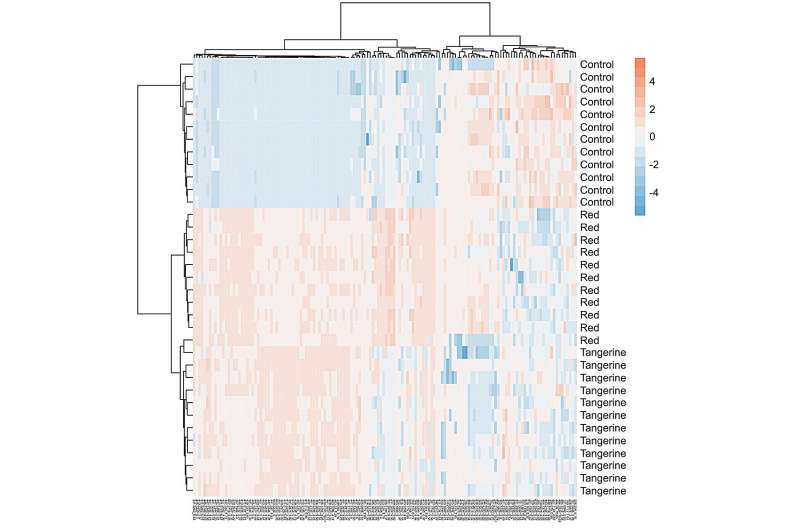This article has been reviewed according to Science X's editorial process and policies. Editors have highlighted the following attributes while ensuring the content's credibility:
fact-checked
peer-reviewed publication
trusted source
proofread
Unraveling the health benefits of tomatoes: A molecular dive

Scientists at U.S. the Department of Agriculture's Agricultural Research Service (ARS) and The Ohio State University (OSU) have been working to investigate how tomatoes may be imparting health benefits in a recently published study.
Studies in animals have shown that incorporating tomatoes into the diet can reduce the prevalence of chronic illnesses like prostate and liver cancer. It has been thought that compounds naturally produced by tomatoes are responsible for these effects. After absorption from a meal, many of the chemical compounds found in tomato fruits travel to the liver, where they are metabolized. Some compounds remain for some time, while others are quickly removed from the body.
Meanwhile, in the liver or other tissues, some of these compounds can alter gene expression in ways associated with positive health benefits. Researchers in the past have largely focused on lycopene, a pigment that gives tomatoes their red color. However, tomatoes produce thousands of compounds, and it has been shown that tomato consumption offers more benefits than lycopene alone. A "big picture" view was missing.
"We know that eating tomatoes is associated with a number of health benefits, and our study intended to dive deeper into what happens when you eat tomatoes from the standpoint of what is absorbed and how gene expression is altered," said Michael Dzakovich Ph.D., a scientist with USDA-ARS Children's Nutrition Research Center.
"Rather than focusing only on one compound, we utilized a technology called metabolomics to broadly profile how hundreds of chemical compounds were changing in the liver as a result of tomato consumption. We also used transcriptomics to measure how all the detectable genes in the liver were changing at the same time. This approach gave us valuable insight into the potential mechanisms by which tomato consumption affects the liver and potentially the whole body."
Scientists tested liver tissue from mice that were fed control diets or control diets enriched with tomatoes to determine what tomato compounds were found in the liver and how gene expression changed. Tomato-fed mice were given one of two diets with the addition of commercial orange and red tomato varieties. Since not all tomato varieties are chemically identical, using multiple varieties allowed for a more comprehensive examination of how tomato consumption affects the liver in general.
"We discovered a series of metabolites [molecules produced by metabolism] that have never been reported in the liver. Several of these compounds have been found in blood, skin, and urine, but our data show that these molecules are more extensively metabolized than we realized," stated Dzakovich. The metabolites are from steroidal alkaloids uniquely produced in tomatoes.
"Steroidal alkaloids have been shown in both in vitro [in the laboratory] and animal studies to lower the absorption of cholesterol, reduce cancer cell proliferation, and reduce muscle atrophy. They also resemble many important signaling molecules made by the body. It seems reasonable to hypothesize they might be a part of a suite of compounds found in tomatoes that benefit human health."
In addition, scientists observed that regardless of the tomato variety, there was an increase in the activation of genes related to xenobiotic metabolism, a series of biological processes that help our body detoxify itself.
This led the authors to hypothesize that one way in which tomatoes may be benefiting human health is in their ability to promote production of the enzymes that allow excretion of potentially toxic compounds. Similar gene expression profiles have been associated with the prevention of cancer development because of consuming vegetables like brassicas (for example, broccoli).
The study is published in the journal Molecular Nutrition & Food Research.
More information: Michael P. Dzakovich et al, Transcriptomics and Metabolomics Reveal Tomato Consumption Alters Hepatic Xenobiotic Metabolism and Induces Steroidal Alkaloid Metabolite Accumulation in Mice, Molecular Nutrition & Food Research (2024). DOI: 10.1002/mnfr.202300239
Journal information: Molecular Nutrition & Food Research
Provided by United States Department of Agriculture

















